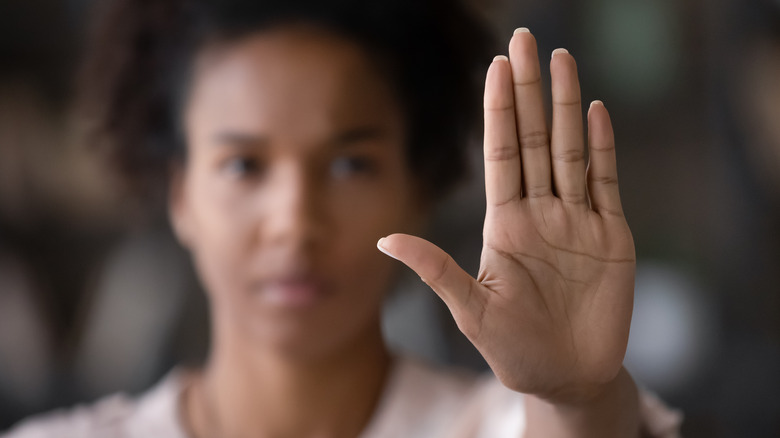Signs That Someone Doesn't Like You According To Science
There once was a time when children and teenagers tested the social waters by passing handwritten notes to one another that read, "Will you be my girlfriend or boyfriend? Check this box, yes or no." These days, those introductions are most often conducted via follows and friend requests on social media. Inevitably, though, there will be people in our lives whom we don't like and who don't like us. Many of them we may still need to interact with at work or school, and it isn't always easy to tell the difference.
Wish there was a surefire way, like a definitive test, to find out if someone doesn't like you, whether in a simple social situation or perhaps for romantic purposes? Or even just while we go about our daily lives? A method, of course, that spares us the awkward situation of simply asking them. Sadly, that foolproof method doesn't so far exist — we sure wish it did — but according to social scientists and relationship experts, there are a few ways to tell pretty clearly how someone feels about you.
Body language often tells the truth
When it comes to human behavior, it's important to note that there is no way to predict how different individuals will react in every social scenario, but the study of body language — called kinesics — has come close. According to anthropologist Ray Birdwhistell (via Research.com), in fact, as much as 35% of human communication occurs through our body language, made up of facial expressions, eye contact, hand gestures, and other kinds of body movement.
If you're unsure whether or not someone likes you, considering how they act when they're around you in terms of their body language is a good place to start. One tell-tale signal sent through body language is what's called "closed-off body language," such as arms and legs crossed when someone is next to you, or if they position their torso away from you. Among the most telling signs that someone may not like you is that they place their feet toward an exit. Body language also applies to how close someone gets to you or how willing they seem to touch, shake hands, or hug you.
Facial expressions don't lie
Among all the different kinds of body language, what someone does with their face when they interact with you can be the most revealing sign of their real feelings. As MomJunction writes, eye contact — both too little and too much (read: glaring) — can indicate someone's inner thoughts, as well as whether or not they tend to smile, frown, or remain blank while they interact with you. Scratching or touching one's neck and pursed lips are also both signals people consciously or unconsciously send their attention has been drawn elsewhere.
Something else to consider: How willing is someone to enter into a social interaction with you in the first place? Do they tend to cancel on you when you have plans? How someone conducts a conversation also matters — do they go in-depth or keep things brief? According to Professor Emeritus of Psychology at the University of California, Los Angeles Albert Mehrabian, 38% of how we communicate is through our tone of voice (per Research.com). In short, a grumpy or disinterested tone of voice indicates whether someone is eager to spend time with you.
Mirror, mirror, on the wall
One final way to tell if someone likes or doesn't like you through body language is called "mirroring," sometimes called the Gauchais Reaction. According to the American Psychological Association (APA), mirroring is a function of mirror neurons in our brains, which also play a part in how we learn by watching others, like how we learn to speak. What researchers have also found is that mirroring happens unconsciously when we are fond of someone and tends not to happen when we aren't. In other words, according to science, because of how our brains work, when we like someone, we tend to unconsciously mirror their actions — and when we'd just rather not mimic them, we don't.
When someone is mirroring, they won't act exactly how you act — cause that would be creepy — but they may pick up certain sayings or expressions like inside jokes, hand gestures, or facial expressions that are similar to your own. For these reasons, mirroring is a common occurrence within families as well as in long-term relationships. With the power of mirroring now well understood, conscious mirroring has become a tool for salespeople to close the deal. But whether or not someone is mirroring your actions, voice, or sayings can also be a clear indicator of how well you're liked or perhaps disliked, regardless of the social situation.



